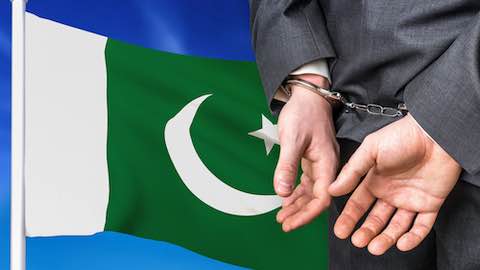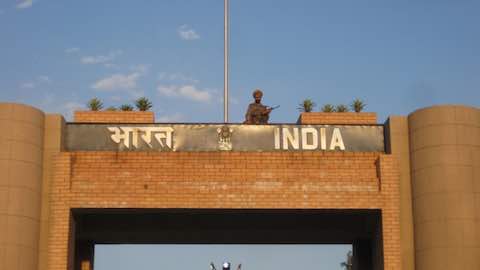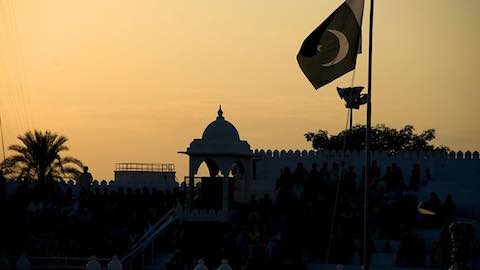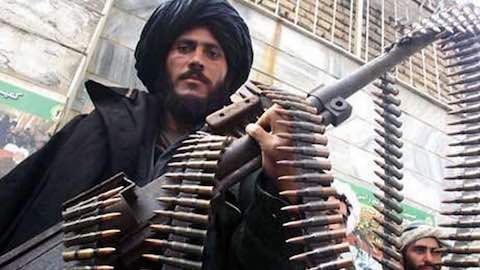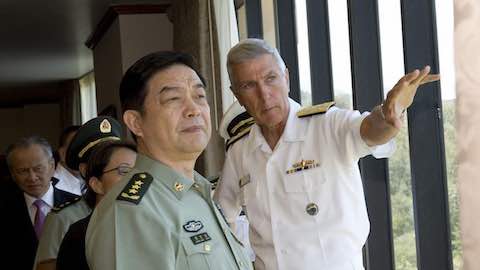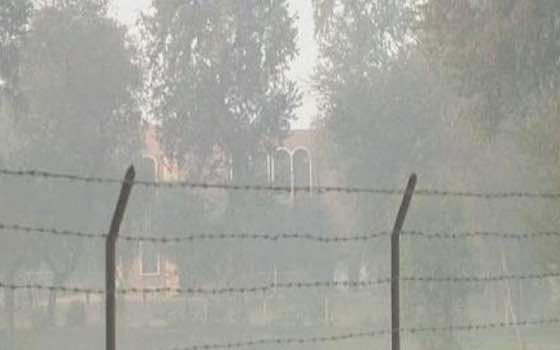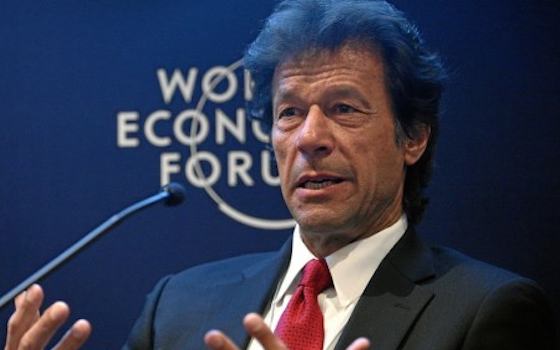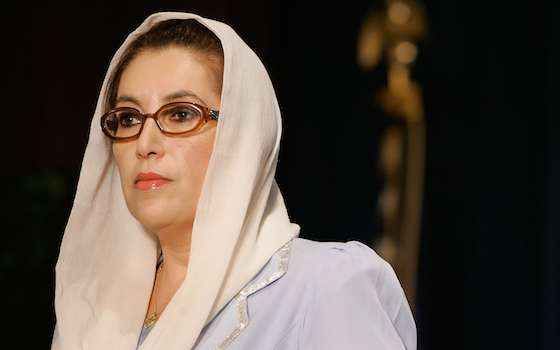- MENU
- HOME
- SEARCH
- WORLD
- MAIN
- AFRICA
- ASIA
- BALKANS
- EUROPE
- LATIN AMERICA
- MIDDLE EAST
- United Kingdom
- United States
- Argentina
- Australia
- Austria
- Benelux
- Brazil
- Canada
- China
- France
- Germany
- Greece
- Hungary
- India
- Indonesia
- Ireland
- Israel
- Italy
- Japan
- Korea
- Mexico
- New Zealand
- Pakistan
- Philippines
- Poland
- Russia
- South Africa
- Spain
- Taiwan
- Turkey
- USA
- BUSINESS
- WEALTH
- STOCKS
- TECH
- HEALTH
- LIFESTYLE
- ENTERTAINMENT
- SPORTS
- RSS
- iHaveNet.com: Pakistan Current Events
Countries
Argentina | Australia | Austria | Benelux | Brazil | Canada | China | France | Germany | Greece | Hungary | India | Indonesia | Ireland | Israel | Italy | Japan | Korea | Mexico | New Zealand | Pakistan | Philippines | Poland | Russia | South Africa | Spain | Taiwan | Turkey | United Kingdom | United States
-
Recent clashes between the nuclear-armed neighbors -- India and Pakistan -- are the worst outbreak of violence in Kashmir since a cease-fire took effect in 2003
-
Just when you think the militant Islamic Taliban movement can't sink any lower, you hear another story as deplorable and cowardly as the shooting of Malala Yousufzai
-
Militant Islamism is not primarily responsible for instability in the region despite claims to the contrary
-
Thousands of flag-waving protesters marched into Pakistan's capital to demand changes to the country's political system just months before scheduled elections
-
Is 'killed by a drone strike' the new 'alive and well'? If you pay close enough attention, it makes you wonder what's really going on. Here's how this charade usually goes
-
Malala Yousafzai is an activist for women's access to education. The Taliban considers that a capital crime. It claimed responsibility for the men who stopped the bus and boarded it, shot her and fled
-
The United States and Pakistan need to continue working to bring policies toward closer alignment and investing in efforts to build stronger ties between our people. Pakistan is 'too big to fail' and offers tremendous potential for playing a more constructive role in its region
-
Pakistan and the United States have pursued an important partnership for the past decade, based on the premise that their strategic goals in Pakistan were the same. This is at best only half true
-
Since the infliction of unacceptable damage may not deter Pakistan from breaking the nuclear taboo, a 'tit for tat' strategy in case of lower order nuclear use is worth considering
-
Afghanistan's war enters its second decade with the Taliban emboldened and the United States enfeebled. But the power-play between Pakistan, India and China is also now central to an assessment of what comes next
-
The plethora of new groups is not only a change from the previous tendency among Pakistani militant groups to form large umbrella organizations like the Tehrik-e Taliban Pakistan (TTP). It also has been accompanied by a breakdown of these larger structures, making it uncertain what kind of command structure the new groups share
-
As ties between the United States and Pakistan continue to sour, speculation is mounting that Uzbekistan may become a new ally of convenience in the US war on terror
-
The villain responsible for the raft of violence against US targets in Kabul has been identified - and the finger points directly to a shadowy insurgent group and, by extension, to Pakistan's intelligence agency
-
It is important to look at 'brand-name' jihadist groups in Pakistan like LeT, al Qaeda, the Haqqani network and Tehrik-e-Taliban Pakistan as loosely affiliated networks more than monolithic entities.
-
Karachi is the biggest city in Pakistan. It is the country's commercial hub, financial capital, naval base, and only operational seaport. For the past several months, this city has once again been in the grip of violence
-
The strategists in the US had hoped that the Taliban would join the reconciliation process and Pakistan would behave. This is unlikely to happen. The American dream project of a free, democratic liberal Afghanistan may be tottering on its last legs
-
In the wake of its strategic partnership agreement with India, Afghanistan has become an untouchable, even an 'enemy', for many Pakistani commentators
-
Scores of states are meeting at the United Nations later this month for a hatefest that promises to be so odious that a dozen Western countries, including the United States, have already announced that they will not attend
-
Pakistan's southern province of Sindh is facing disaster once more with heavy rains over the past five days, according to the Provincial Disaster Management Authority (PDMA). Two million people in 15 out of 23 districts have been affected
-
There's been some tough love in America's relationship with Pakistan lately. Both a recent standoff over foreign aid and the U.S. arrest of American citizen Syed Ghulam Nabi Fai on illegal lobbying charges have increased mistrust in an already unsteady partnership. But even with tensions high, this is not one of those relationships that either side can walk away from easily
-
Most people in Pakistan and around the world have forgotten the victims of the 8 October 2005 earthquake which killed 73,000 people in Pakistan-administered Kashmir and the Khyber Pakhtoonkhwa Province
-
Though Pakistan and Afghanistan still continue to be embroiled in religious and ethnic conflict, the rest of South Asia appears keen to check and go beyond such tendencies
-
Poor Pakistan. The United States has bullied and abused the country for so long, forcing the government to take $22 billion in aid, that it's no wonder intelligence agents are showing up at the doors of people with pro-American biases, threatening to kill them
-
The U.S. drone program has its roots in the late 1990s, when unmanned -- and unarmed -- aircraft tracked and spied on al Qaeda in Afghanistan. After 9/11, then U.S. President George W. Bush ordered U.S. drones, at that point equipped with missiles, to kill leaders of al Qaeda. Since assuming office, Barack Obama has greatly accelerated the program
-
When viewed in the context of other recent attacks in Kabul and other parts of Afghanistan, the Taliban's attack on the Intercontinental Hotel was not all that spectacular. It certainly did not kill the 90 people the Taliban claim, although it does have a number of interesting security implications
-
The 165 schools UNICEF has agreed to build cannot cater for the needs of all the quake-affected children, such as the disabled
-
It is apparent that the United States is exploring ways to accelerate the drawdown of its forces in the country. It is also clear that U.S. relations with Pakistan are deteriorating to a point where cooperation is breaking down. These are two intimately related issues. Any withdrawal from Afghanistan, particularly an accelerated one, will leave a power vacuum in Afghanistan
-
Analyst Kamran Bokhari examines the internal struggles of the Pakistani state following U.S. intervention in the country to kill Osama bin Laden.
-
Since May 2, when U.S. special ops forces killed Osama bin Laden, the media have covered the raid from virtually every angle. The United States and Pakistan have also squared off over the U.S. violation of Pakistan's sovereign territory and Pakistan's possible complicity in hiding Bin Laden. All this, however, largely ignores the years of intelligence development in the hunt for bin Laden
-
America's involvement in Pakistan and Afghanistan may be the most complex foreign-policy dilemma the nation has ever faced. And with the death of Osama bin Laden, along with Pakistan's furious response, the knot is growing ever more tangled.
-
Recent reports suggest the Pakistan Navy may be on the cusp of developing a naval nuclear missile capability, even as its plans for acquiring a nuclear submarine capability gradually become clearer
-
The US seems to be devising a multi-pronged agenda to compel Pakistani acquiescence in the ongoing stabilisation efforts in Afghanistan and ensure its long term presence in the region
-
Militarization is no substitute for development when it comes to combating radicalism in the Afganistan and Pakistan
-
Pakistan has once more shut its border with Afghanistan, blocking a third of NATO supplies. What are the alternatives, and how much do they cost?
-
The murder of infants, particularly girls, by poverty-stricken parents in Pakistan appears to be on the rise.
-
Pakistan is neither an ally nor an enemy of the United States. Both countries have a long track record of partnering on important strategic goals. But in the last two decades, U.S. and Pakistani interests have seriously diverged
-
Neither the United States nor Pakistan views the other as a reliable ally. U.S. officials have tried to sweep this uncomfortable truth under the rug for too long
-
John Maynard Keynes once wrote: "when the facts change, I change my mind. What do you do, sir?" The recent death of Osama bin Laden on May 1 in Abbottabad, Pakistan, has prompted a reassessment of the facts regarding the west's fight against international terrorism and its involvement in Afghanistan and the wider region
-
Pakistan's Sindh Province has recorded a sharp increase in reported cases of human trafficking since the beginning of the year
-
A survey found multiple problems at temporary settlements, of which 75 percent lack lighting and 46 percent lack blankets. Residents at 39 percent of settlements have reported acute watery diarrhea or other air- and water-borne disease
-
The United States can remain in Afghanistan indefinitely but it cannot defeat the Taliban, and it has many important issues to attend to elsewhere
-
Women in the Swat Valley in Pakistan's Khyber Pakhtoonkh'wa province are working harder than ever to keep their households running
-
Today, Islamic fundamentalists dream of acquiring a bomb. And with Osama bin Laden dead and al-Qaeda's relevance waning, how better to regain notoriety than to set off a nuclear weapon in some Western city?
-
In comments that could rile Congress, Pakistan's ambassador to the United States said that his country doesn't seek U.S. aid, but ending it would hurt U.S. relations with the Pakistani people
-
Temperatures in the southern Pakistani province of Sindh's Badin District, the area worst affected by floods which began in August, are still warm, though tens of thousands of people without adequate shelter are beginning to feel chilly at night
-
Mutual distrust between the United States and Pakistan in part results from mistakes and misjudgments by both countries that date back to the 1979-89 Russian occupation of Afghanistan. But at its heart is an American strategy that not only runs counter to Pakistan's interests
-
It behooves both the United States and Pakistan to reappraise the situation, take stock and course correct. World peace, or at the least regional peace, may depend on it
-
For a symbol of how America's decade-long war is going in Afghanistan, look at the fields of red poppies flowering so bountifully there
-
As Pakistan and China reinforce their relationship, questions have arisen around the changing nature of this alliance, the rhetoric that sustains it, and the implications of greater Chinese influence in Pakistan, particularly for the US and India
-
Another round of flooding in Pakistan offers the United States an opportunity to build goodwill in a strained relationship
-
The sheer volume of negative media attention would lead any attentive reader to believe that Pakistan-U.S. relations are headed toward a severe, maybe violent, rupture. Memory is short, but the U.S.-Pakistan alliance is nearly as old as Pakistan itself
-
Despite legitimate concerns about Pakistan's loyalties, it remains in the United States' national security interest to maintain our bilateral relationship with Pakistan
-
Karachi's astonishing violence is generally ascribed to political and ethnic rivalry. While this may be true to an extent, its roots run deep into the incredibly complex structure of this city of 18 million people, where politicians, criminals, terrorists and migrants from nearby warzones compete for power and survival
-
Implementing the necessary reforms in Pakistan's power sector requires able leadership and internal stability as well as a conducive and transparent environment for attracting investment
-
'You cannot afford to alienate Pakistan,' Foreign Minister Hina Rabbani Khar averred. And Prime Minister Yusaf Raza Gilani confidently asserted: 'You can't live with us -- or without us.' Think again. A few days later, the Obama administration opened negotiations to improve relations with Uzbekistan, Afghanistan's authoritarian neighbor to the north
-
Across the earthquake zone, of the 5,751 schools requiring reconstruction, 27% percent (1,552) have not been completed by the start of September 2011. This has meant that many children have not been able to go to school for a very long time
-
What is especially alarming in Pakistan is that healthcare practitioners themselves are responsible, in many cases, for the spread of Hepatitis due to unsafe techniques. In addition, nearly 15 percent of paramedics are themselves infected by the hepatitis virus, as are 7.3 percent of nurses, 6.8 percent of doctors and 5.2 percent of medical students based at major hospitals
-
Confirmation that a two-year-old has polio in Diamer District of Gilgit-Baltistan region, northern Pakistan, has raised fears that the disease could have spread to areas previously believed to be free of it, despite a national polio emergency plan launched by the government in January
-
The death of Osama bin Laden, and the manner in which it was carried out, will have major repercussions for Afghanistan and Pakistan.
© iHaveNet.com
HOME | WORLD | USA | BUSINESS | WEALTH | STOCKS | TECH | HEALTH | LIFESTYLE | ENTERTAINMENT | SPORTS
Current Events in Pakistan
Pakistan News & Pakistan Current Events. Current Events from Pakistan
Your Single Source to Current Events in Pakistan
Your Single Source to Current Events in Pakistan
RSS Feeds | Shopping | Email Alerts | Site Map | Privacy
